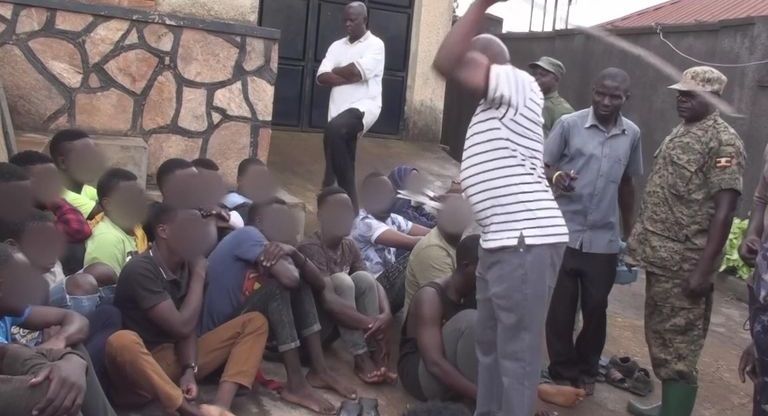19 LGBT+ people detained under coronavirus laws in Uganda finally allowed access to lawyers after six weeks

In a 2020 raid, Ugandan men were whipped by officials before being chained and walked to the police station. (Screen capture via YouTube)
Nineteen LGBT+ people who were detained, whipped and interrogated in Uganda under the guise of coronavirus laws have finally been allowed access to lawyers, after being imprisoned for six weeks.
The 13 gay men, two bisexual men and four transgender women were arrested on March 29 when police raided a shelter on the outskirts of the Ugandan capital Kampala.
Police in Uganda charged all 20 with defying social distancing rules, but activists have accused authorities of using the coronavirus pandemic to target LGBT+ minorities.
Four men were released on medical grounds, while the remaining 19 were were charged with committing “a negligent act likely to spread infection of disease” and “disobedience of lawful orders”.
Harrowing footage emerged of the raid in which the local mayor asked the men who their parents were and hitting one of them on the hands with a huge cane. The men were also made to face the camera to reveal their faces.
The 19 queer people have been detained for six weeks with, until now, no legal assistance.
According to Reuters, lawyers representing the group told Uganda’s High Court that a ban on prison visits to curb the spread of coronavirus meant they could not contact their clients before their trial, set for May 18.
The judge ruled in favour of the lawyers from Human Rights Awareness and Promotion Forum (HRAPF), and agreed that the detained LGBT+ people deserved to access legal counsel.
HRAPF’s executive director, Adrian Jjuuko, said: “It’s been a long battle, so we’re excited by today’s ruling because I think the High Court recognises that even during COVID-19 the right to a fair hearing is non-negotiable.”
Activists say the arrests are part of a slew of targeted attacks by law enforcement against the community, and the Human Rights Watch has accused authorities of using the pandemic as a “bogus pretext” to harass LGBT+ people.
“Prosecuting authorities should drop charges and release 19 Ugandan youth who have committed no crime,” said Mausi Segun, the Africa director at Human Rights Watch.
“It is not a crime to be homeless and live in a shelter, and the ongoing detention of the shelter residents is arbitrary, abusive, and contrary to public health.”

